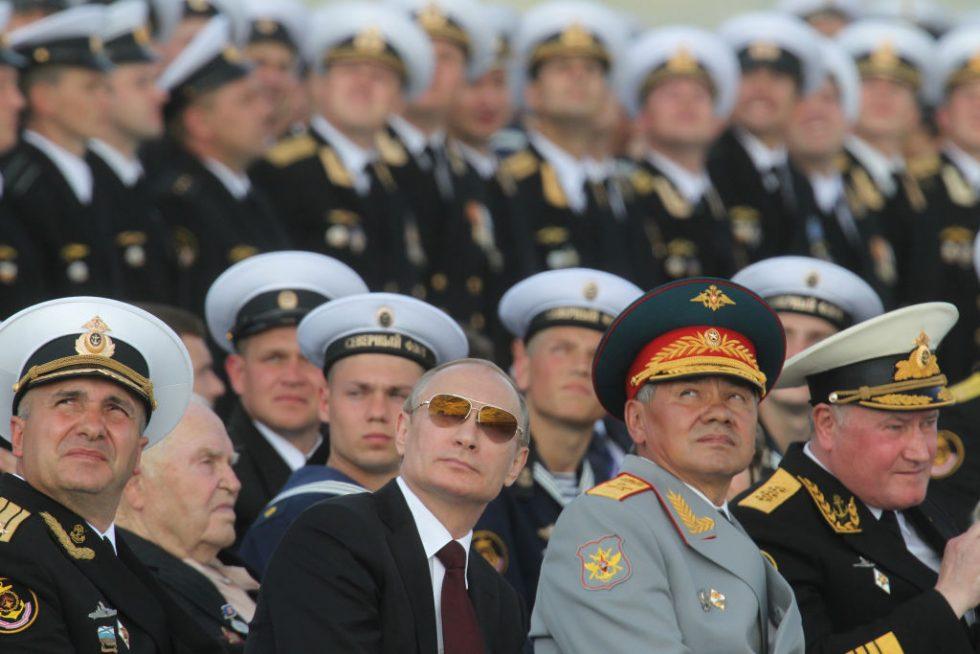GDP isn’t everything
Posted By David Uren on November 11, 2019 @ 15:10

The Economist recently contrasted the cold shoulder that Russian President Vladimir Putin received at the 2014 Brisbane G20 Summit in the wake of his annexation of Crimea, invasion of Ukraine and downing of the MH17 passenger plane with his triumphalism now, as he forges deals in the Middle East, strengthens bonds with China and advances a European rapprochement.
‘How did a country with an economy the size of Spain, corruption on a par with Papua New Guinea and life expectancy below Libya achieve all this?’ the magazine’s editorial writer asked [1].
With the latest International Monetary Fund global database showing that Australia’s economy, with a GDP equivalent to US$1.4 trillion, is about the same as Spain’s and only slightly smaller than Russia’s US$1.6 trillion, it is a question that could also be asked here.
Russia’s example is used by those who suggest that Australia should have a greater strategic influence than it does, and that it would do so if its military spending was closer to Russia’s level of just under 4% of GDP, rather than the current target of 2%.
There are several problems with this analogy, quite apart from the strategic influence implicit in Russia’s stockpile of several thousand nuclear weapons.
The current US dollar measure of Russia’s economy gives a misleading indicator of its size. As any traveller knows, a dollar buys a lot more in some countries than in others (Thailand versus Sweden, for example).
The IMF compiles a measure of the ‘purchasing power’ of the incomes of the world’s nations to account for this difference. This shows that Russia’s economy is equivalent to US$4.4 trillion while Australia’s measure is unchanged at US$1.4 trillion.
Russians are still much poorer than Australians—their purchasing power per person is US$29,600 compared with Australians’ US$53,400. But with a population of 150 million people, or six times Australia’s, it stands to reason that their total economy is able to marshal resources far greater than ours.
Some measures of national military capability look at more tangible measures such as steel and energy production, as well as population. Russia is the world’s fourth largest generator of electricity behind China, the United States and India, and ranks ahead of Japan and Germany. Its output of 1.1 million gigawatts is more than four times Australia’s.
Russia’s steel production of 71.7 million tonnes makes it the world’s sixth largest producer. Although far behind China’s staggering 928 million tonnes, Russia’s output is vastly greater than Australia’s 5.7 million tonnes.
Russia devotes a far greater share of its much larger economy to its military. World Bank figures show that, unsurprisingly, the Middle East tops the table of military spending [2], with Saudi Arabia devoting 8.7% of its economy to defence and Israel allocating 4.3%. Russia’s spending is high at 3.9% of GDP.
Australia’s spending of 1.9% of GDP is relatively high among advanced countries. The OECD average of 2.2% is skewed by the United States’ spending of 3.2% of its GDP. France and Greece are the only advanced nations to spend more than Australia.
The World Bank data show that global spending on defence has been coming down since the 1960s, when the average was more than 6% of GDP.
Sidestepping the vagaries of GDP measurement and exchange rates, the size of a nation’s armed forces provides a different benchmark. Russia’s 1.4-million-strong military is fourth largest in the world, behind India, China and North Korea. With a base in conscription, it is 25 times larger than Australia’s military forces.
How hard would it be for Australia to spend more? To lift defence spending to around 4% of GDP would require savings elsewhere in the budget equivalent to the amount that the Commonwealth spends on schools and hospitals combined, or only slightly less than it spends on the age pension. To finance it with tax would require lifting the GST rate to around 16%.
The Abbott government sought to make savings that would rise to around 2% of GDP in its 2014 budget, with measures such as slashing the indexation of spending on education, health and pensions while imposing co-payments on Medicare and limiting unemployment benefits. The political backlash forced it to abandon virtually all savings measures, with the exception of deep cuts to foreign aid. How governments tax and spend are political decisions and depend on the level of public support they can muster.
An analysis [3] by the Parliamentary Library shows that confronted with the reality of warfare, the public will make extraordinary sacrifices to support military spending.
During World War II, defence spending rose to 40% of GDP, and the government spent more than twice as much on supporting the armed forces as it spent on everything else. Defence spending was largely funded with war loans.
History contains many examples of small nations defeating much larger states. An influential academic article [4] on the determinants of military success downplays the impact of material factors, such as spending as a share of GDP, population or steel production.
Its analysis of hundreds of battles fought between 1898 and 1987 found that economic development was the most important factor.
‘Consider that in 1850, Great Britain’s GDP was only half that of India’s, yet Britain’s fourfold advantage in economic development (as measured by per capita income) translated into vastly superior weapons and organization, which in turn facilitated political domination’, it argues.
The Economist’s explanation for Russia’s new strategic effectiveness is two-fold.
‘In 20 years, Mr Putin has turned Russia’s armed forces from an ill-managed bunch of poorly equipped conscripts into a well-armed, largely professional fighting force. But he has also been politically more astute than the West, both in swiftly seizing opportunities and in sticking by his allies’, it says.
Article printed from The Strategist: https://aspistrategist.ru
URL to article: /gdp-isnt-everything/
URLs in this post:
[1] asked: https://www.economist.com/leaders/2019/10/26/the-west-should-learn-some-lessons-from-vladimir-putins-success
[2] military spending: https://data.worldbank.org/indicator/ms.mil.xpnd.gd.zs
[3] analysis: https://www.aph.gov.au/About_Parliament/Parliamentary_Departments/Parliamentary_Library/pubs/rp/BudgetReview201314/DefenceExpenditure
[4] article: https://www.tandfonline.com/doi/full/10.1080/01402391003603581
Click here to print.